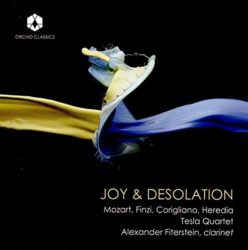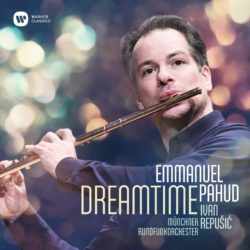Classical Album Reviews: Beethoven’s “Leonore,” Tesla Quartet’s “Joy & Desolation,” and Emmanuel Pahud’s “Dreamtime”
By Jonathan Blumhofer
A fresh, bracing take on Beethoven as a dramatist, Tesla Quartet serves up refreshingly direct and emotionally complex performances of Mozart, and flautist Emmanuel Pahud has crafted an ear-catching, unpredictable program.

Ludwig van Beethoven’s 250th birthday comes at the end of 2020 and, while his output’s already been documented to death (and then some), that fact surely won’t stop record labels and ensembles of all types from reissuing more Beethoven recordings than anyone needs. While many will certainly be fine, they will likely find it hard to top René Jacobs’s revelatory new account of Leonore, the original 1805 version of Beethoven’s only complete opera (usually presented in its 1814 revision as Fidelio).
To put it simply, the original Leonore offers a fresh, bracing take on Beethoven as a dramatist. Yes, it’s been recorded before (notably in the 1990s by John Eliot Gardiner), but the piece doesn’t turn up on disc (or on the stage) frequently and, while Fidelio may be tighter, musically, Leonore is far more successful as sheer musical drama.
It’s spread out over three acts (Fidelio compresses the action to two), each of which has its unique character. Thus, the first, with its lighthearted, comic undertones comes across as, essentially, an updated Mozartian Singspiel. The second introduces the nefarious figure of Pizzaro and, appropriately, turns darker. The story reaches its fulfillment in the grim, Don Giovanni-esque atmosphere of the third act, which packs tension and both musical and moral force into its stirring grand finale.
From the downbeat, Jacobs’s performance is captivating. The Freiburger Barockorchester’s brash, freewheeling account of the overture sets the pace and, frankly, nothing lets up until the opera winds down nearly two hours later. Throughout, they play with radiant energy, crisp articulations, and excellent balances: the bassoon and horn obligato parts in Act 2’s “Ach, brich noch nicht” speak robustly, and the instrumental introduction to Act 3 is starkly beautiful as can be.
Jacobs’s casting is excellent. Marlis Petersen sings a brilliant Leonore, golden-toned and supple. As Leonore’s husband, Florestan, Maximilian Schmitt brings a mix of nobility and shattering intensity to the role: his “Gott, welch dunkel” is conspicuous for its bleak desperation.
Dimitry Ivashchenko’s Rocco is sturdy and vibrant (and blends well, too, in the Act 1 trio with Marcellina and Jaquino). In those roles, Robin Johannsen and Johannes Chum sing with an ingratiating lightness of touch and winning flexibility of tone. Johannes Weisser’s Pizzaro is chilling and sinister as one might want, while Tareq Nazmi’s Don Fernando makes the most of his brief third-act appearance.
Taking the choral parts, the Zürcher Sing-Akademie brings blazing heat to the concluding chorus and searing urgency to the Act 2 prisoners’ chorus.
In a word, then, this is a remarkable performance of a striking piece. Beethoven was an inveterate reviser, and some of the changes he incorporated into his two reworkings of Leonore were for the better. But Jacobs – whose informative program note explains, in depth, why he views this original version of Fidelio as the superior one – has made a convert out of me. Give it a listen: he might make a disciple out of you, too.
 One of the first surprises of the Tesla Quartet’s new album with clarinetist Alexander Fiterstein is how it turns its title, Joy & Desolation, on its head. Surely, you’d think, Mozart’s A-major Clarinet Quintet is an essentially joyful, if a sometimes melancholy, piece.
One of the first surprises of the Tesla Quartet’s new album with clarinetist Alexander Fiterstein is how it turns its title, Joy & Desolation, on its head. Surely, you’d think, Mozart’s A-major Clarinet Quintet is an essentially joyful, if a sometimes melancholy, piece.
And yet, in this performance, even its most carefree moments are tinged with autumnal sadness: the first and third movements have a bittersweet edge to them. So does the glorious “Larghetto,” which is one of the loveliest things Mozart penned. Even the charming finale doesn’t quite shake the first three movements’ sense of vulnerability.
Surely this is an interpretive choice and, my, is it a welcome one. Mozart’s music is often played with a too-healthy respect for its delicacy (which typically results in expressive antisepsis), and, while the Teslas and Fiterstein turn in a roundly elegant performance of this Quintet, it’s one that digs deep, expressively: the finale’s minor-key third variation, for instance, weeps plangently, while the opening theme of the “Larghetto” sings with preternaturally profound meaning.
Theirs is, then, some refreshingly direct and emotionally complex Mozart playing.
The Quintet is paired with a shapely account of Gerald Finzi’s roundly bucolic Five Bagatelles in an arrangement for clarinet and strings. The first drives amiably, while Fiterstein imbues the second-movement “Romance” with glowing soul. Relaxed lyricism marks the “Carol” and “Forlana,” while the concluding “Fughetta” gambols with cordial spirit.
John Corigliano’s 1995 Soliloquy (an arrangement for clarinet and string quartet of the slow movement from Corigliano’s Clarinet Concerto) provides a warmly meditative space. And Caroline Heredia’s Ius in Bello draws on Latin American influences and recent events in Venezuela to craft a turbulent, ultimately ambiguous soundscape.
The result is a compelling, diverse album from one of the best chamber ensembles (and clarinetists) out there. If, like me, you loved the Tesla’s debut disc, this one picks up where it left off, with a vigorous, probing, though-provoking program and performances. Don’t miss out.
 Hand it to flautist Emmanuel Pahud for crafting an ear-catching, unpredictable program for his new album, Dreamtime. There are a couple of pieces you might expect on a disc with such a title, like Carl Reinecke’s Ballade or Mozart’s Andante in C major (K. 315). But the two biggest works hail from the late 20th century and the last bit of filler is courtesy of Ferrucio Busoni. Somehow everything adds up.
Hand it to flautist Emmanuel Pahud for crafting an ear-catching, unpredictable program for his new album, Dreamtime. There are a couple of pieces you might expect on a disc with such a title, like Carl Reinecke’s Ballade or Mozart’s Andante in C major (K. 315). But the two biggest works hail from the late 20th century and the last bit of filler is courtesy of Ferrucio Busoni. Somehow everything adds up.
Part of the reason for that is because these disparate pieces share some commonalities. Krzysztof Penderecki’s Concerto for Flute and Chamber Orchestra is, in its adherence to essentially conventional concepts of counterpoint and form, actually not that far removed from Mozart. Similarly, the lush lyricism of Toru Takemitsu’s I Hear the Water Dreaming and the quirky, unpredictable melodic lines of Busoni’s Divertimento offer bridges to the genial sound world of Reinecke. At the end, you’re left wondering why these pieces aren’t heard more often in each other’s company.
OK, that last may owe to the fact that most of them are wildly demanding, technically and expressively.
Penderecki’s 1992 Concerto, for instance, runs the gamut of illusive scenarios. Its seven movements range from playful to menacing, dancing to serene (and much in between). A few moments recall Penderecki’s career on the cutting edge of the avant-garde (cluster trills for the strings in the third movement, lively doublings and striking instrumental textures throughout – including vigorous scoring for rototoms) but the piece is largely in his neo-diatonic style.
Pahud plays it with a winning blend of energy, delicate tonal shadings, and an emphasis on the music’s underlying lyricism. Indeed, the distance between its rhythmic gestures and songful ones is never too far, as the segue from driving figures to a mellifluous duet between flute and clarinet in the Concerto’s fourth movement demonstrates.
Reinecke’s D-major Flute Concerto, on the other hand, is essentially rhapsodic, its first movement agile and graceful, the second tranquil, and finale euphonic. Pahud plays it with lilting elegance – the second movement’s dramatic outbursts are wonderfully shaped – as well as, especially in the finale, impish playfulness.
Similar musical and performance characteristics mark his readings of the Mozart and Busoni (as well as Reinecke’s Ballade).
Dreamtime closes with that most beguiling of essays, Takemitsu’s 1987 score. Just 10 minutes long, I Hear the Water Dreaming seems to inhabit a world all its own: lush, shimmering, phantasmagoric. Pahud and the Münchner Rundfunkorchester (led by Ivan Repušic) shape it perfectly, with captivating tenderness and color.
Jonathan Blumhofer is a composer and violist who has been active in the greater Boston area since 2004. His music has received numerous awards and been performed by various ensembles, including the American Composers Orchestra, Kiev Philharmonic, Camerata Chicago, Xanthos Ensemble, and Juventas New Music Group. Since receiving his doctorate from Boston University in 2010, Jon has taught at Clark University, Worcester Polytechnic Institute, and online for the University of Phoenix, in addition to writing music criticism for the Worcester Telegram & Gazette.
Tagged: Alexander Fiterstein, Emmanuel Pahud, Harmonia Mundi, Orchid, René Jacobs, Tesla Quartet
